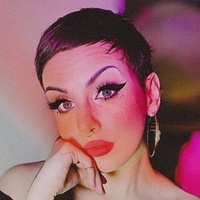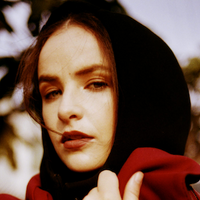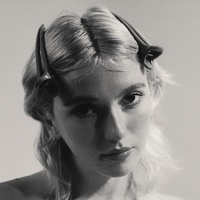As told to Elle Nash, 2749 words.
Tags: Poetry, Writing, Education, Process, Mental health, Success, Failure.
On being your own cheerleader
Poet and writer Lauren Milici discusses having confidence in first drafts, putting in the work, and finding inspiration in your contemporaries.What was the process of putting together your first book, Final Girl, and this new book, Sad Sexy Catholic? They’re thematically connected.
Final Girl came about because I had a horrible, traumatic experience in the MFA program, and I was writing through my survival, and then getting it published as a “do-si-do” with Emily O’Neill’s chapbook was beautiful and perfect. And then, with Sad Sexy Catholic, I was like, “Okay, what happens after you’ve survived the thing?” Now you’re left with all this other shit that has come up to the surface. That’s what I went for with this. This one’s a little bit more like, “Our narrator got out of West Virginia, so I’m happy for her. Now what’s happening?” And it’s all the weird shit that has happened since then, just navigating life after the survival.
What is the process like for you in writing a poem? How do you come to the page? Is there anything that gets you to start working on one?
Reading someone else’s poem. If I want to sit down and write, I will open as many tabs with different poems as I can. I call it waking up the muse. If I love the way someone else starts their poem, or I love a line, I feel like the muse just starts talking to me. I’m like, “Okay. Cool, cool, cool.” But also, sometimes you can just listen to the radio, and you think, “That’s the dumbest song. This is so stupidly catchy.” But then there’s one lyric that can just make me like, “Huh.” And I write it down, thinking, “Maybe this can be an anchor, or a non-sequitur, or it can be a title.”
Can you talk about how you and the publisher came to the decision of giving the book pink pages? And a little bit about how you think it’ll affect the experience of reading the poems?
It’s such a dream, right? I didn’t really have a say with my first book, which was fine. I love the simplicity of the Final Girl covers, and I like how they mirror each other since it was published as a double. But I remember saying to Liza, “Okay, what if we go all out with the blasphemy on this one?” And we were like, “What if it’s prayer book size?” And it is. It’s perfectly traditional prayer book size. The art was by this wonderful man named Joel Amat Güell. I was like, “Look, here are all these Catholic vaporwave images from Google. Can we do something with this?” And then it evolved into, “All right, what if it’s pink on the cover?” And I was like, “Oh, cool.” Because he said, “Honestly, it being black, it looks very hot topic, Lauren.” And I responded, “But I want it to be hot topic.” All of a sudden Liza suggested, “What if the pages are pink, too?” And I said, “We can do that? That’s allowed? Don’t hurt me like this. We can actually do that?”
Everyone thought it was a great idea. It’s cool when the people you’re working with see your vision, too. I think it would’ve been cute if the pages were normal and stuff, but I think the pink pages add this element of the vibe that’s divine feminine. The overarching theme of this book is identity and guilt, and the horrible soup that your parents made when you were a child. And then, how that weirdly bubbles to the surface as an adult when you are trying to just navigate literally anything. But then also, when you do all this work on yourself, and you come into your own, and you’re trying to align with your higher self. To me, when I see my higher self, she is this divine feminine, really tall, long insanely flowing black hair. And she floats, and she looks like an anime character.
I love it.
That’s a very long-winded way of saying that the pink pages are supposed to represent divine feminine.
Do you ever get stuck in a poem when you’re writing? And what do you do when you feel that sort of frustration with your work?
There is a poem that I only finished just recently. I left it alone for a year because I genuinely had no idea what to do with it. Sometimes I try to write the poem backwards, or I try to just extract a line, and put it in something else. I’ll go back, and I’m like, “I really like this line. Can I put it in something I’m working on now?” It gets repurposed that way, so then it just ends up being a collection of lines, that I can go back and pull from.
Endings are so fucking hard for me. I guess in undergrad, the emphasis was always put on the end of the poem because that’s where the power is. When you go into running a poem with that in the back of your head, you’re like, “Oh my god, if the ending of this sucks shit. Then what’s the point?” Sometimes I get in my head, and get in my own way because of that.
How do you deal with the self-criticism when you’re working?
It’s really hard to turn that off. It’s funny because before the MFA, I had a lot more confidence in first drafts. And then, you get to three years of being with people who don’t understand why your poems aren’t about the spring, and trees, and conventional shit. No one in that fucking program wanted to write about anything other than the hills of West Virginia.
What’s your day-to-day process like with writing poems? Are you constantly working on something? How do you balance your day job with reading, and writing, and that sort of thing?
I have not been doing a good job with that as of late. I go through these ruts where I am thinking about writing poems, and I am writing down ideas for poems, and then I’m just not writing anything. But I write from nine to five all day for my day job. And I’ve had other poets be like, “Well, you are technically always writing poetry, even if you’re not writing poetry.” And I’m like, “Huh, okay.” People complain that they’re writers who hate writing. And I’m like, “Oh, that’s interesting.” For me, it’s like I have to write.
It’s been very sporadic lately and very not as organized as I’d like to be because I’m very much a five to nine before the nine five person. I have to get up, and I’m such a morning person that the birds chirp, and everything is so great, and I get all this work done. I try to get up way before I start my day job, and carve out an hour to just write literally anything, even if it’s garbage. I think it’s Natalie Goldberg who said, “Give yourself permission to write the worst junk in America.” And sometimes getting that stream of consciousness out first thing, it helps with the rest of my writing week for some reason.
Do you feel like you write more in periods of stress? Or do you feel like you write less in periods of stress?
I had a friend once tell me that she can only write poems when she was going through something really shitty. And I remember staring at her and being like, “I feel like I write the best when I’m away from the situation, or I’m away from a period of stress.” It’s like when the “early writers” went to France thinking that they would all write about France, and then they ended up writing about America.
I feel like I write better when I’m actively working on my breathing, and trying to not freak the fuck out. Some of the most chaotic, and maybe fun things I’ve written have come out of stress, but I don’t necessarily know if those are of the highest quality.
Do you ever feel poems can be over edited?
Oh my god, yes. I’m going to say a fun shitty thing about not all workshops, but certain workshops. Because in a really great workshop environment, your peers’ feedback, it can be the most wonderful beneficial thing in the whole world. That is the community that I tried to cultivate when I taught, and my students loved workshopping. I feel like my poems were so over edited in my MFA, to the point where I got so frustrated where I was like, “All right, I’m only doing the edits that the workshop leader says to do because if I agree with everyone around me, what’s going to be left of the poem?”
With Erin Taylor, their book that just came out, Bimboland, there is nothing conventional about the work in there. That’s been my little reference book as I’ve been trying to write because everything they do in that book would make an MFA higher up person tear their hair out. I love it so much because of that. And the speaker of each poem is so sure of themselves, and I’m just like, “Okay. All right. There’s no over-editing in these. So, I got to get back into that mentality of what I say goes, because I know what I’m trying to say.”
I love that about developing intuition and trust within the self. If there is one thing that I have learned from Erin, it’s that institutional recognition is not something you need to succeed as an artist. I loved Bimboland so much. Are there particular poets that you find yourself always going back to? I know for sure Emily O’Neill is a big inspiration for you. And I know you had a really great poem that was after Mary Oliver that I think hit hard on Instagram, didn’t it? I saw it at some point when I was scrolling and I was like, “Oh, this is amazing.” I saw your name, and it had thousands of likes…it really resonated with people.
Oh my god. Richard Siken’s Crush was my gateway drug. It’s my little Bible. I always go back to that. Always. I just gifted that to this gentleman I’m talking to for Valentine’s Day. I was like, “You need this. Yes. You are just as emo as I am. This is for you.” There’s something so incredible about that book that I’ve tried so hard to write actual academic shit about it, and I just end up being like, “I don’t know, it’s just really good.” It’s really hard to explain how beautiful and magical it is. I’m trying to think what else I always go back to. I love Dorothy Chan’s stuff a lot.
I try to read as many contemporary poets as I can. I’ll go back to Plath every now and again, but I’ve never written a sonnet. I’ve never written anything in an actual form. You can’t make me. Sierra De Mulder, too. New Shoes On A Dead Horse I think is my favorite chapbook from her. So, I’ll go back to that. There’s a weird nostalgia feeling for that because she was one of my first ever poets. That was my first time ever seeing a chapbook on a shelf. And I was like, “I could do that.” Oh, I also love Molly Brodak so much.
When you saw the chapbook on the shelf and you were like, “I can do that. I want to do that.” What formulated in your mind how you were going to make a plan of action for that? What were the steps that you took immediately after that, that you were like, “This is something that I need and want in my life, that I’m going to do?”
There was no question of me not going to an MFA. My major in undergrad was writing in a general sense. The people around me were like, “Well, you’ll get in no problem, so you just have to go.” I figured, “Oh, well, that’s when I’ll start writing my chapbook because I’ll have all this time to write,” which is a myth about the MFA. But it really wasn’t until I had that horrible traumatic event, and that brought all of these things I hadn’t worked on up to the surface. The chapbook started to form.
I didn’t know at which point I would get to have a book that’s on a shelf. I use the Law of Assumption. I’m like, “I’ll have this eventually and I just need to do the [first] thing right now.” The success of Final Girl was really cool because I am nobody. I have no reach, my engagement is shit, and yet, I have this weird little cult following. And the book, someone buys it in PDF form like every week still, which is very cool for a book that came out in 2019. To go from like, “I guess people read this. That’s cool.” To me, going on Instagram yesterday, and seeing my book on two bookstore shelves, on the Barnes and Noble shelf, was so “How did we get here?”
When you talk about the law assumption, is that just like you are assuming in your mind that this is real for you?
Yes. I always assume that everything will work out for me. As long as I’m putting in the effort and the work and I’m working towards it, it’s going to happen. And if it doesn’t happen, it’s the universe looking out for you. I assumed I was going to get into a Ph.d. program. I hated my academic experience. Why would I want to be in a Ph.d. program for six years? So, that was the universe being like, “Girl, do you want to live on $16,000 a year for another six years?” And I was like, “Good point.” And because I didn’t get in, I somehow landed this entertainment writing job that I have right now. Especially, in an industry where everything is rejection all of the time, you have to be your own cheerleader. Even if it feels like bullshit, you have to get up, and you got to do what the TikTok girlies are saying. You have to say, “I am lucky.”
Lauren Milici Recommends:
This is sort of a two-for-one because I wouldn’t have remembered the song if it hadn’t been interpolated but: Charli XCX and Rina Sawayama sampled “Cry For You” by September in a song called “Beg For You” and I completely forgot how beautiful and genius and powerful and fun “Cry For You” is. Near-perfect song to scream to in the car.
Andrea Cabassa released a beautiful song called “aquialli,” which means “here, over there” in Spanish. I’m just in awe of her writing, recording, and mixing this song all by herself in her Upper East Side apartment. She’s a treasure of a gal.
I can’t believe I’m recommending a Youtube channel of this, uh, capacity, but Cow Chop was something of a sociological experiment that I truly believe our children’s children will study at the university level one day. Highly problematic, very NSFW, and answers the question, “What if we did Jackass but on a smaller but somehow more disgusting scale and we also decided to spray literal toxic spray paint into our mouths?” It’s like a car crash that I can’t stop watching.
The poet Jackie Braje has a new chapbook out from Bottlecap Press called 408 and I just absolutely adore what she does with imagery in her work. Everything is so pretty and cinematic, like I always feel like I leave earth for a little while and am floating.
I’m not a big podcast gal anymore, but Wine & Crime reigns supreme for me when it comes to the comedy-true crime genre. It’s three gals with Minnesotan accents that have been best friends since middle school. So not only do we get a type of crime and background/psych on said crime, but we also get some wild childhood stories and some delightfully funny anecdotes—and they use their social media platforms to raise money for marginalized people in need. 10/10 no notes.




